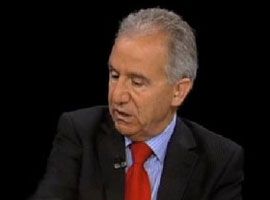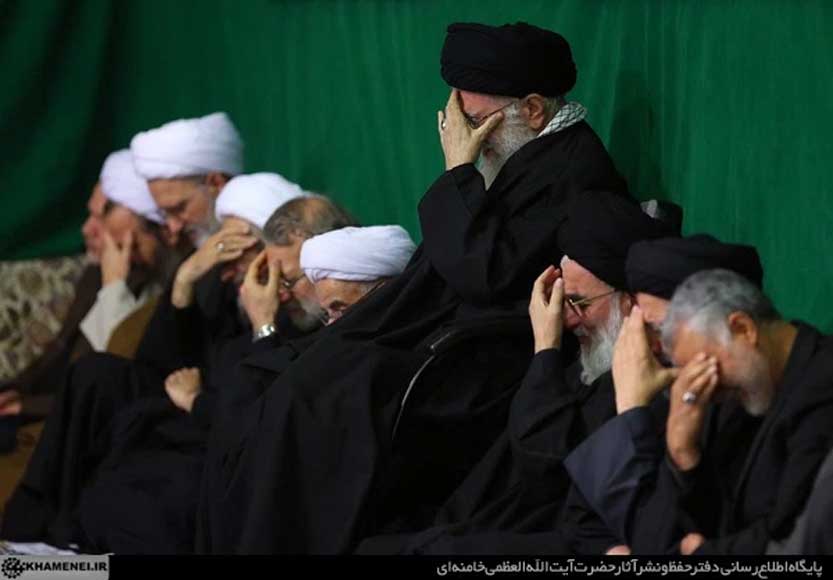May 19, 2018
By Parviz Dastmalchi
The leaders of the Islamic Republic of Iran are the masters of the lose-lose strategy, both in domestic affairs and foreign policy. The self-appointed messengers of God who continue to promise heaven on Earth have instead created a living hell through their violent and costly rule in the past 40 years.
The Iranian banking system has all but collapsed. The rial has fallen to record low against major

foreign currencies. The regime’s mission to spread Shia doctrine throughout the world and its regional ambitions have drained the country’s treasury and deprived its citizens of the peace and prosperity they deserve. The current state of affairs in Iran is the antithesis of the Islamic Revolution’s promise of creating a “free, prosperous and just” society.
The regime dreamed of destroying the “Great Satan,” namely the U.S. and its closest ally Israel, but instead, it has been isolated by the international community, crippled by economic sanctions, and is on the verge of collapse.
One of the significant strategic blunders of the Islamic Republic was its plan to obtain nuclear capabilities to guarantee its survival. However, the program has created nothing but problems for the country and the Iranian people. The regime lied about its real intentions to its people and the international community. Military satellites detected and photographed nuclear sites and activities that the establishment tried so hard to hide from the “prying eyes” of its “enemies” and people. The authorities disguised their true intentions behind the slogan “nuclear energy is our inalienable rights.” But everyone except for the unsuspecting Iranian public knew that the regime was trying to obtain nuclear weapons. Between 2006 and 2015, the UN Security Council issued 11 resolutions against Iran’s nuclear activities and ballistic missile program. “Let them issue as many resolutions as they want,” was Iran’s official response.
The reformists and hardliners were unified against the West. Iran’s Supreme Leader Ayatollah Ali Khamenei and President Mahmoud Ahmadinejad persisted in their defiance until the crippling sanctions devastated the country’s economy. There would not have been a need for the 2015 Joint Comprehensive Plan of Action (JCPOA), better known as the Iran nuclear deal, if the country’s leaders had shown political flexibility and implemented the articles of the UN resolutions at the time.
The Iranian government entered secret negotiations with the U.S. two years before the signing of the JCPOA. Subsequently, Mr. Khamenei invoked “heroic flexibility” as a face-saving measure to justify the acceptance of the nuclear deal. President Hassan Rouhani’s so-called government of “wisdom and justice” negotiated the JCPOA with the P5+1 (Britain, France, Russia, China, the U.S., and Germany.) The JCPOA is an agreement and not an international accord. It is valid only as long as all the parties stay committed to its articles. The P5+1 signatories are not penalized for withdrawing from the agreement. Why did the Islamic Republic sign the deal? Were they hoping for sanction relief? The sanctions would have been lifted if Iran had implemented the articles of the UN Security Council resolutions, and there wouldn’t have been a need for the JCPOA. Only one-third of the sanctions were eased as the result of signing the nuclear deal. The Islamic Republic has been the principal loser in the nuclear game.
President Donald Trump announced on May 8 that the U.S. was withdrawing from the JCPOA. Khamenei has described the U.S. action as a “mistake.” Whether the decision to pull out of the agreement was right or wrong is irrelevant at this point. It is clear that revoking the sanction relief will cost Iran billions of dollars.
The correct foreign policy would deprive a political opponent of the ability to harm one’s interest irrespective of the “mistakes” or “ill intentions.”
The P5+1 and many countries in the Middle East will unite against Iran if it decides to pull out of the JCPOA and resume its nuclear activities. The situation would then revert to the period before the “heroic flexibility.” Tehran would gain nothing by remaining in the JCPOA and work with Russia and the EU because most of the European companies would not engage in business with Iran for fear of being penalized by the U.S. Meanwhile, new and tougher sanctions will cripple the Iranian economy.
In 2015, a district court in New York ordered the French bank BNP Paribas to forfeit $8.83 billion and pay a $140 million fine for violating sanctions against Iran, Cuba, and Sudan. In 2017, Germany exported $111 and $3 billion to the U.S. and Iran, respectively. Most if not all international companies would ultimately side with the U.S. to protect their interests. The clerics and the Majlis (Iranian Parliament) deputies can shout anti-Western slogans and burn the American flag, but at the end of the day, the real power rests with the U.S. The legitimate criticisms of Trump’s policies notwithstanding, he has succeeded in checkmating Iran in the international political chess game. And no amount of protests by other signatories to the JCPOA will help Iran.
Syria has proven to be a political and military quicksand for the Islamic Republic. The regime’s vision of using Syria as a conduit to channel Shia doctrine to the rest of the region has failed. It is sinking fast in this political, economic and military quagmire. The establishment has consistently lied to the Iranian people. It blamed the “Zionist regime” for spreading false rumors about the presence of the Islamic Revolutionary Guards Corps (IRGC) troops in Syria. The authorities changed their story and announced that Iran had dispatched a limited number of military advisers to Syria. Later they admitted to having deployed many battalions to protect the holy shrines. Given the significant troop losses, the IRGC couldn’t lie any longer about its involvement in the Syrian conflict.
The Iranian Army at first denied having deployed any troops to Syria. But later, it announced that some of its soldiers had voluntarily gone to fight in Syria. There is ample evidence proving that the IRGC, the Qods special forces, the Army, Fatemiyoun Division (Afghan Shia militia), Zainab Brigade (Shia Pakistanis) and Hezbollah are all fighting in the Syrian conflict. More than 2,000 members of the Fatemiyoun Division have reportedly been killed and another 8,000 injured in the past six months. An army must be 50,000 strong to sustain such heavy casualties and still be able to continue to fight. Iran shoulders the financial cost of maintaining all these forces in Syria. The regime has squandered the national treasury in its effort to spread the Shia ideology throughout the world. And in the process, it has managed to bankrupt the country and cause immeasurable suffering to the Iranian people.
The Islamic Republic’s two-pronged objective in Syria is aimed at ensuring the survival of President Bashar al-Assad’s regime, and poses a severe threat to Israel. The world has known about the regime’s regional ambitions for a long time. President Vladimir Putin has used Iran to further Russia’s objectives in Syria. However, Moscow has abandoned Tehran at this crucial juncture. After spending billions of dollars and defending Assad’s authoritarian rule for the past seven years, the Islamic Republic has finally concluded that there is no military solution to the Syrian conflict. More than 75 percent of the population of Syria is Sunni. If free elections were to be held in Syria, Assad and the minority Shia population supporting him would be easily defeated.
Meanwhile, Israeli Air Force recently struck Iranian military bases and installations inside Syria, killing and injuring many IRGC fighters and commanders. Tehran has claimed that the Israeli forces had attacked Syrian and not Iranian positions. This is not very surprising given that the regime and the IRGC might face fierce opposition and criticism inside and outside the country if they were to admit that Israel had severely damaged their large military facilities in Syria. Russia has remained conspicuously silent about the Israeli attack. Curiously enough, its air defense system had not detected any activities in the Syrian airspace before the strike.
The Islamic Republic has failed to strengthen the so-called Shia crescent in the Middle East or ensure the survival of Bashar al-Assad or pose a serious threat to Israel. An attempt by the IRGC to attack Israel would spell the end of the regime itself. In that scenario, Iran would plunge into a civil war. In the past four decades, the Islamic Republic has systematically destroyed the country’s economy, violated the human rights of its citizens, brutalized political dissidents, terrorized religious minorities, oppressed women, failed to invest in the country’s young people and neglected the education of its children. It has no chance of surviving the current crisis.
The U.S. and the EU don’t align their interests with that of the Iranian nation. The domestic and foreign policies of the regime have brought the country to a dead end. Many rumors are circulating about the inevitable demise of the Islamic Republic. There is no shortage of theories within the ruling elite about the future of the country. While some speak of a military government as the only viable alternative, others promote the idea of turning Qom into a Vatican-like city sate. There are also those who warn that a popular uprising would spell a horrible end to the theocratic rule of the Shia clerics. A regime that dreamed of ruling the world is now advocating the creation of a city-state in Qom. The IRGC which has been the backbone of the Islamic Republic is now poised to usurp power. These developments point to the impending demise of the regime.
In the Islamic Republic, power rests with the supreme leader and his inner circle. The executive branch carries out Ayatollah Khamenei’s orders. The theocratic rule in Iran is based on a hollow ideology. The 1979 Islamic Revolution was a historical, grassroots and reactionary movement which spread quickly and manifested itself around the world even in the West. It was a movement against modernism. It opposed human rights, gender equality, freedom of speech, open society and liberty. The Islamic Republic cannot be reformed. It has refused to change and evolve in the past 40 years. An ideological theocracy should abandon its rule in favor of a democratic civil government.
Power is the real political tool. It is the responsibility of democratic forces to unify people against a despotic regime. Ultimately it is the public that can succeed or fail in changing an authoritarian rule. A tyrannical state doesn’t voluntarily relinquish power by holding referendums and free elections. People must challenge the system. The recent protests by the workers, women opposing the mandatory hijab, and ordinary citizens criticizing the government for failing to address the country’s economic problems are excellent examples of people’s power.
The current conditions inside and outside Iran point to an impending and significant change. During the recent nationwide protests, many people chanted: “The enemy is right here. It is not the U.S. as they say.”










اینها البرادعی را حسابی خریده بودند
If the Iranian people were that naiive or gullible to think the Mollah’s were doing anything other than building a bomb when they revived the nuclear programme having declared it a waste of the Islamic treasury then they deserve runway inflation and this government. The Mollah’s have been following the North Korea model and believed having ANY atomic bomb would get them the respect they don’t deserve. And given Trump’s mistakes with NK they were right